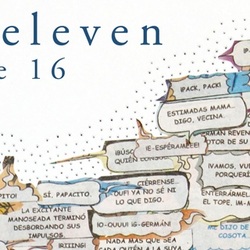 Grateful and gratified to have a little story of magical realism in the latest issue of Eleven Eleven. The story, "U+2204," is part of a larger ms. of stories titled Paper Bird Ash. One of these days I'm going to get around to seeing about having the ms. published in its entirety. Meanwhile, I like seeing the individual stories getting into print one by one. You don't have to know what "U+2204" means to appreciate the story but if you google and find out, it will add to your enjoyment and/or deepen your understanding. I hope. The Next Big Thing continues. Kara Vernor was tagged by Michael David Lukas.
What is your working title of your book (or story)? She Could Maybe Lift a Car (a chapbook of short shorts) Where did the idea come from for the book? Each story sprang from a different idea, though several were sparked by memories of the TV shows I watched in the '80s. What genre does your book fall under? Literary flash fiction. Which actors would you choose to play your characters in a movie rendition? Many of the female characters are young and a mix of heroic and tragic. Jennifer Lawrence comes to mind because of her role in "Winter's Bone." For the men, someone pretty-ugly, like Joel Kinnaman from the show "The Killing." What is the one-sentence synopsis of your book? A flash fiction chapbook with stories about potential, restlessness, the influence of '80s television, sex, beer, feminism, blood, alienation and desperation. Will your book be self-published or represented by an agency? I hope it will be published by a small press. How long did it take you to write the first draft of your manuscript? Two years. What other books would you compare this story to within your genre? My stories are similar in style to many of the flash writers published by Rose Metal Press, the female writers in particular. Who or what inspired you to write this book? I was inspired by flash journals such as Quick Fiction, Wigleaf, Smokelong Quarterly, and Necessary Fiction, and as well by many flash writers: Stephanie Freele, Kathy Fish, Elizabeth Ellen and John Jodzio come to mind. Discovering writers and markets I appreciate and "get" made me think they might "get" me back. What else about your book might pique the reader's interest? Maybe some of the individual titles? Here are those of the '80s-themed stories: "Don Johnson Is Not Your Man"; "The True Love of Magnum P.I."; and"David Hasselhoff Is From Baltimore". Kara tags Dave Dulberg, who will post next about his novel, Makeshift. I'm thrilled an excerpt of my novel-in-stories, Blow the House Down, was published at Joyland Magazine. I knew it was coming, of course, but now it's actual and that feels great. Joyland is doing great work, and I really appreciate being included. Thanks to editor Kara Levy.
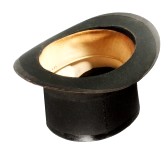 Tristan Tzara knew something about the creative power of community and constraint. During a Dadaist rally in the 1920s, Tzara offered to create a work on the spot by pulling words at random from a hat. We applied this technique to writing flash fiction, pulling the five words that each of us contributed from a hat at timed intervals and thereupon their selection immediately incorporating them into the stories as we drafted them. Come hear the results! Tzara’s Hat: Five Writers, Five New Works at the legendary Litcrawl. Phase One: 6 - 7:00 pm, Oct 13, 2012. Four Barrel Coffee. 375 Valencia St. SF. 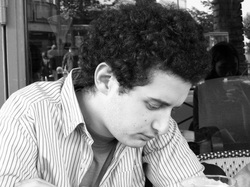 Daniel Levin Becker Daniel Levin Becker is the youngest member of the Paris-based Oulipo collective. His essays, reviews, fiction, and translations have appeared in The Point, Monolith, The Believer, American Book Review, Formes Poétiques Contemporaines, The Wall Street Journal, The Quarterly Conversation, Drunken Boat, Berfrois, and others, and anthologized in Avery, Sudden Flash Youth, and the forthcoming second volume of The &Now Awards. His first book, Many Subtle Channels: In Praise of Potential Literature, was published in April 2012 by Harvard University Press. Kirkus called it "more palatable than expected." 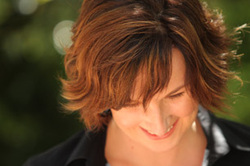 Ethel Rohan Ethel Rohan is the author of the story collections Goodnight Nobody (forthcoming 2013) and Cut Through the Bone, the latter longlisted for The Story Prize. She is also the author of the chapbook, Hard to Say. Her work has or will appear in World Literature Today, Tin House Online, The Irish Times, The Rumpus, Post Road Magazine, and The Los Angeles Review, among many others. She earned her MFA in fiction from Mills College, CA. Raised in Ireland, Ethel Rohan now lives in San Francisco where she is a member of the Writers Grotto. 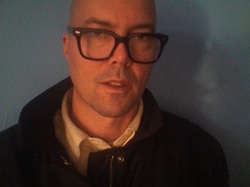 Janey Smith Janey Smith is the writer of Animals (2011, Plain Wrap) and The Snow Poems (2012, NAP). She is fiction editor at Metazen. If you want to hang out, 415.202.4378. 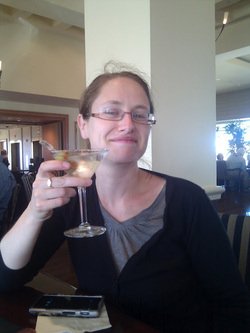 Olga Zilberbourg Olga Zilberbourg was born in St. Petersburg, Russia and moved to the United States at the age of seventeen. Her first two books of fiction were published in St. Petersburg, where her parents still reside. "Where Does the Sea Flow," a short film based on one of Olga’s stories, was recently selected as a finalist in the Manhattan Short Film Festival. Olga’s English-language writing has appeared in Narrative Magazine, Santa Monica Review, J Journal, Mad Hatters’ Review, Prick of the Spindle, HTMLGiant, and other print and online publications. Olga is a senior associate editor at Narrative Magazine.  Peg Alford Pursell Peg Alford Pursell. Me. Who you already know all about, or can by going to the home page (click on my name). I had such a great time yesterday talking about flash fiction at the California Writers Club Peninsula Branch. What a lively group of people, engaged and engaging. President Chris Wachlin surely sets the tone. Many thanks to Max Tomlinson, who heads up the programs, for asking me and giving me such a lovely introduction. I enjoyed questions about the differences between vignettes and flash fiction, and what exactly is a "telling moment," for example -- I really love the opportunity to rethink what I think I know.
I'll give another flash fiction presentation at the San Francisco Writers Conference in February. Check out the website -- scholarship and contest opportunities. A new year means new flash fiction classes. I've got two coming up.
An Introduction to Writing Flash Fiction College of Marin, Kentfield Feb 01, 2012 - Mar 14, 2012 1:10 pm - 3:00 pm Wednesdays 7 weeks, $79 You can register here. How to Write Flash Fiction -- And Why You Want To Book Passage Corte Madera March 10 10 am - 3:00 pm $85 Book Passage (On-line registration soon.) Charles Baxter says flash fiction stories “are between poetry and fiction, the story and the sketch, prophecy and reminiscence, the personal and the crowd.” Flash fiction is one of the most exciting story forms to read and write. The practice of writing these short-shorts causes you to flex your best writing muscle: precision. New outlets make this a growing market for publishing. Learn what makes these short-shorts different from other forms, and how writing them can improve your writing overall. Cheryl Ossola blogs about the flash fiction event at Book Passage I read at with Molly Giles and Meg Pokrass two nights ago.
I particularly like: "Sometimes overeager disclosure occludes the craft beneath the content (or reveals that there is none). This wasn't that kind of writing. Peg, Meg, and Molly launch their ideas with skill, sophistication, wit, and elements of surprise. In fact, their messages hit home with the speed and accuracy of arrows whose tail feathers were still reverberating when the next petite, potent tale began. In just over an hour, we listeners squirreled away bits and pieces of a rich array of stories (or even entire ones), carrying them home in our hearts and minds to savor later." Thanks, Cheryl, for this thoughtful review. |
Occasional TidbitsVery occasional! Archives
March 2020
Categories
All
|
 RSS Feed
RSS Feed
